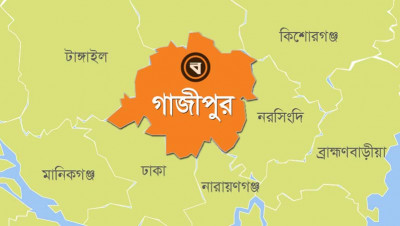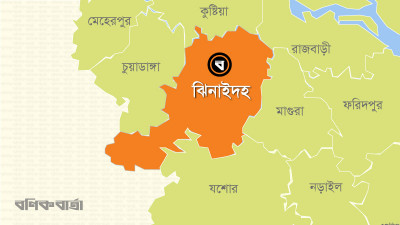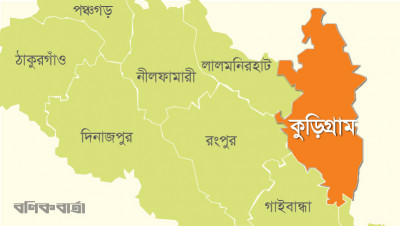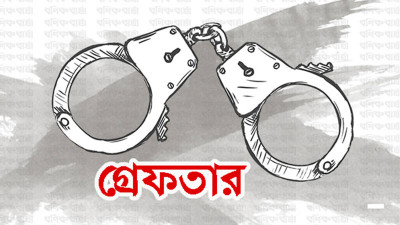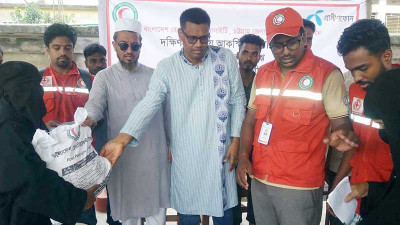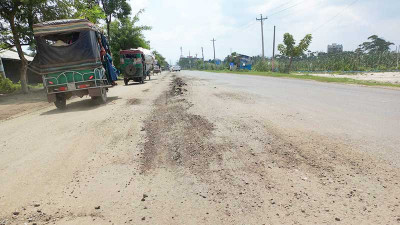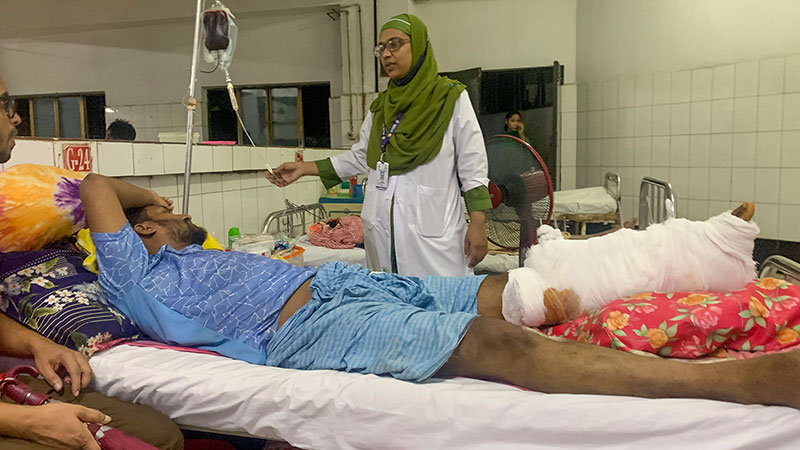 On 19 July, most gunshot patients came for treatment. Photo: Tawhiduzzaman Tapu
On 19 July, most gunshot patients came for treatment. Photo: Tawhiduzzaman Tapu Mohammad
Kefayet (a pseudonym), a tenth-grade student at Alatunnessa High School in the
capital city, was chatting with friends under the flyover in Middle Badda on
the morning of July 19. During this time, a clash erupted surrounding the quota
reform movement, and Kefayet was shot in the leg. He is undergoing
treatment at the National Institute of Traumatology and Orthopaedic
Rehabilitation (NITOR). Due to the spreading infection, his right leg had to be
amputated from the knee to save his life. However, the infection is still not
under control, and doctors have informed his family that another surgery might
be needed.
His
relatives allege that Kefayet did not receive timely medical treatment. Despite
taking him to various hospitals, both public and private, none were willing to
admit him. His uncle told Bonik Barta, “After he was shot, we took him to at
least five hospitals in the capital, but none were willing to admit him, saying
treatment was not possible there. Several hours were lost driving him from
hospital to hospital in an ambulance, during which he suffered significant
blood loss. Doctors have said the bullet severed the artery and vein in his
leg.”
Last
week, protests and clashes erupted across the country over the quota reform
movement in government jobs. There were also reports of attacks, vandalism, and
arson in various locations, resulting in numerous casualties.
In
NITOR’s Casualty-2 ward, opposite Kefayet's bed, lies Abid (a pseudonym), an
employee of a sweet shop. He was also shot on July 19 during a clash related to
the quota reform movement on Chittagong Road in the capital. His left leg had
to be amputated below the knee. He will have to stay in the hospital for
several more weeks to recover, but he laments that he will have to live the
rest of his life on one leg.
Kefayet
and Abid are not the only ones; several others admitted to NITOR have had their
legs amputated after being injured in violence surrounding the quota reform
movement. During a visit to the hospital on Wednesday (July 24), it was
observed that 34 people were admitted to the Casualty-2 ward alone. Among them,
27 were shot in the leg, and six had their legs amputated. Seven others were
shot in the arms. Similar scenes were observed in other wards.
Regarding
the amputation of limbs, Professor Dr. Jahangir Alam, head of NITOR's Yellow-1
unit, said to Bonik Barta, “We had to amputate the legs of patients whose
arteries or veins were severed by bullets because the lack of blood flow would
cause the tissue to decay or die, leading to significant harm to the patient’s
body, including damage to vital organs like the kidneys. Thus, doctors decide
to amputate the affected limb to save the patient’s life.”
He
further added that it is not possible to assume that patients whose legs have
been amputated will recover immediately. “The stump will have to be sewn later,
as fluids will leak from the wound, which needs to dry. As a result, many
patients have to stay in the hospital for a long time. If a patient’s condition
is good, we send them home and ask them to return after two to three weeks. If
it is found that the infection in the bone and tissue has not decreased and the
discharge continues, surgery is performed again. Each patient’s condition is
treated accordingly. For those whose bones were fractured by bullets, the wound
must heal before surgery. Otherwise, there is a risk of infection. Such
patients require a long recovery period."
According
to sources at the hospital director’s office, 1,693 patients came to NITOR's emergency
department for treatment between 7 am on July 17 and 7 am on July 24. Of these,
241 were gunshot victims, with the highest number, 214, arriving between July
19 and 21.
NITOR's
Nursing supervisor, Sabitri Rani Chakraborty, said that some of these patients
were in critical condition, and most of them were admitted and underwent
emergency surgery. Some still require major surgeries, for which doctors are
waiting for the infections to be controlled.
Due
to the clashes and violence related to the quota movement, the number of
patients at the National Institute of Traumatology and Orthopaedic Rehabilitation
significantly increased compared to regular days. Dr Kazi Shamim Uzzaman, the Director
Professor said that the leave of many doctors and hospital staff was canceled.
He said, “We usually always have a high patient load, but the unstable situation
caused an increase in patients, requiring us to work extra hours. Some leaves
were also canceled.”
Regarding
the treatment, he added, “We have performed emergency surgeries on the gunshot
victims, but major surgeries will take time as we need to stabilize their
condition and control infections before proceeding with further operations.”

